As the temperature goes down, your inherent worry that your corgi might be cold goes up. The last thing you want for your pooch is to catch a cold.
But are your worries founded? Corgis clearly have enough hair in their coat to make a full-blown teddy bear, so they should be capable of withstanding a few blows of cold wind, right?
Well, maybe. Corgis can be a complex bread; a lot depends on the individual corgi and their genetics. But some general rules can be applied to every corgi.
In today’s article called “Can corgis live in cold weather”, we’ll go over: the origins of corgis, the usefulness of their coat, their genetics, and how to know if you’re doing too much or too little to protect your corgi from cold.
We can’t promise that we won’t go into a little bit of detail. Still, we’ll try to keep everything as easy to understand as possible. You’ll certainly learn something about your corgi, which you didn’t know by now.
Alright, enough with the pleasantries, let’s get into it.

Can Corgis Handle Cold Weather?
Corgis do well in the cold. A walk or even a day outside in the snow shouldn’t be a problem.
However, anything more than that and your corgi might start suffering from some health issues, both physically and psychologically.
Firstly, let’s go over why they tolerate cold weather (some even enjoy it) so well. Then, we’ll cover the points against corgis spending a lot of time out in the cold.

Corgi Origins
Pembroke and Cardigan corgis come from Wales.
Welsh weather is fairly diverse. Compared to England, it rains even more; thankfully, corgis are able to deal with wetter conditions fairly successfully. More on that in the Corgi Coat section.
As for the actual temperature in Wales, it’s also pretty diverse. This depends on the region you’re looking at. Still, average temperatures are around 21 °F in winter and around 80 °F during the summer.
So relatively cold winters and not the hottest summers.
Looking at the regions more closely, the coastal areas tend to get a little hotter, and the inland can get both cold and snowy.
Pembrokes Welsh corgis are named after Pembrokshire, a region in Wales right next to the Atlantic Ocean.
Although wet, Pembrokshire does have a milder climate compared to some other parts of Wales.

Corgi Coat
Now to prove that the last section wasn’t us wasting your time, let’s go over some of the characteristics of a corgi’s coat.
Corgis have a very thick double coat. The first layer, their overcoat, is mostly there to keep them dry. Although it isn’t waterproof, it can certainly withstand some relatively wetter conditions.
As for their inner layer of coat, it’s there to keep them warm during the winter and cool them during the summer.
Since they’re doable coated, it’s easy to understand why most corgis like spending time in the cold and especially in the snow.
The snow provides a good amount of entertainment and challenge as well. As all corgi owners know, a bored corgi will bark your head off until you stimulate him.
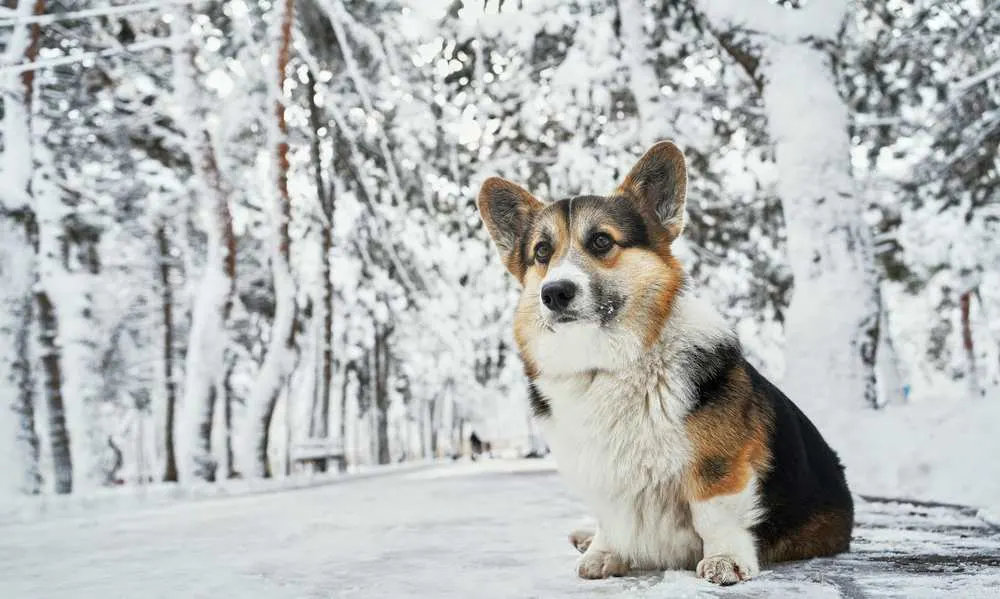
When Do Corgis Get Cold?
Due to that double coat we mentioned, it takes quite a long time for rain and snow to start bothering your corgi.
This means if you’re just taking your pup for a walk or half an hour of playtime in the park, they should be more or less okay. The exercise itself should provide enough warmth.
However, if you’re going hiking on a snowy mountain, taking your corgi with you (without any extra equipment to keep him warm) is not something we would recommend.
Anything around 35, 40 °F for more than 25 minutes, 30 minutes at the most, is acceptable. Lower temperatures, on the other hand, do require extra equipment.
Also, and we’ll cover this a bit more in-depth down below, we don’t recommend keeping your corgi outside for a number of reasons.
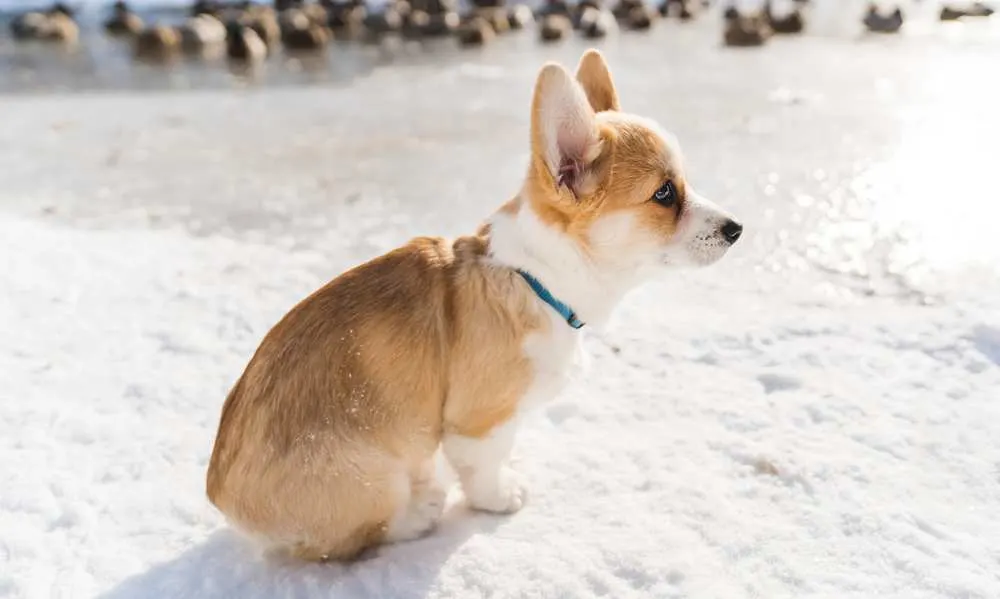
Why They Shouldn’t Live Outside?
1. They don’t like being alone.
Corgis are very sociable dogs. Especially Pembroke corgis, a Cardigan Welsh corgi, might not be bothered if you forgot to pet them that one time you came from work, but a Pembroke will feel heartbroken.
This shows that corgis don’t like being alone. If you make them live outside, they might develop separation anxiety and become destructive.
Corgis aren’t low-maintenance dogs, at least not when it comes to spending time with them. Future corgi owners should definitely keep that in mind.
2. Your neighbors will hate you.
This ties into the previous point. Corgis are feisty. Small dogs with big personalities. If they feel like protesting, they will bark your ears off and of the entire neighborhood.
Also, corgis are serious guard dogs. If they see someone coming into their territory, again, they will bark. This constant barking can be a serious issue for some people.
If you have a problem with your corgi barking a lot, here are some tips on what you can do:
- Ignore them: If you show any kind of response when your corgi starts barking, he might think it’s a reward and will bark even louder.
- Teach them the “Quiet” command: Basically, make them bark by using a toy, then give them a treat, then say “quiet.” If they don’t bark and are even confused a bit, give them a treat. Keep doing both of these things until both you and your corgi have mastered the “Quiet” command.
- Socialize your corgi: Having your corgi meet your neighbors and people that come by often will make him trust them. If they see a familiar face walking by or coming in, they shouldn’t be barking.
3. The constant outside noise might be too much.
Since corgis are so vigilant, they have a hard time tuning out the outside noises. Cars, sirens, your neighbor’s TV, or God forbid thunder, can all keep them wide awake even in the middle of the night when they should be sleeping.
Dogs can indeed suffer from insomnia, and that’s the last thing you want for your pup.
4. They’re just as durable as we are.
Corgis’ body temperature is quite similar to ours, just a few degrees higher. This means they’re comfortable with similar conditions we’re comfortable with.
Now you might be thinking, “well, what about their thick coat? These Corgi Care people don’t know what they’re saying”, and you’re right, they do have a thick coat, but that might not always be such a great thing.
If you leave your corgi outside in the cold and rainy weather, you put your corgi at risk of hypothermia.
Since their outer coat is water-resistant and not waterproof, it will give out at some point. This can cause hypothermia which is extremely dangerous and even deadly.
Some signs of hypothermia are:
- Red eyes
- Warm ears
- Slow breathing
- Dilated pupils
- Dry nose
If your corgi is exhibiting any of these signs, dry them if they’re wet and put them in a thick blanket before calling a vet.
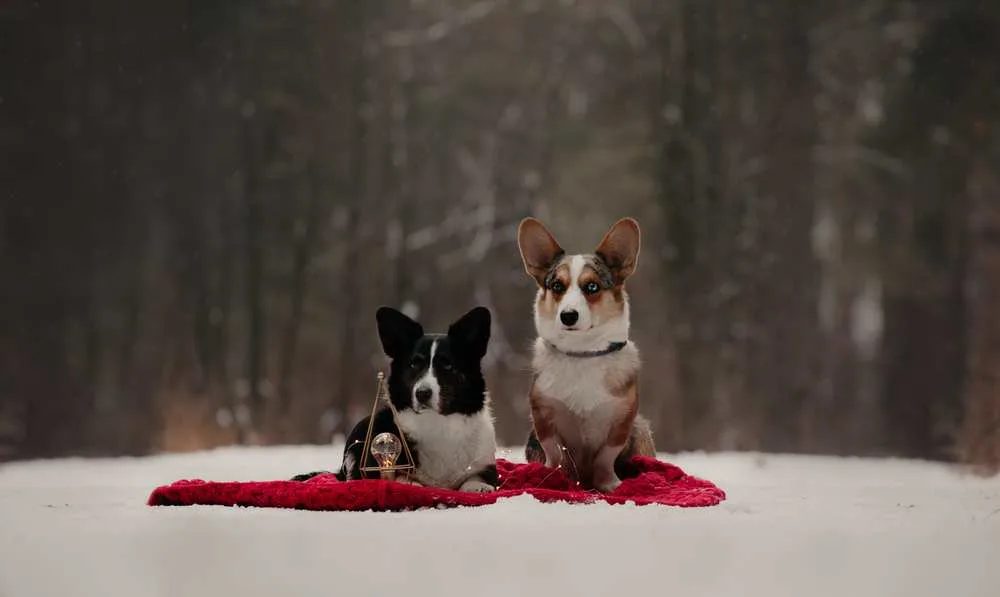
Signs Your Corgi Is Cold
Although they enjoy colder weather, corgis can also get cold. Some of the most common signs your corgi is cold are:
- Its paws are off the ground
- Its tail is tucked in, and it has a hunched posture
- It’s whining
- It’s seeking shelter
- It’s shivering
- It looks anxious or uncomfortable
What To Do If Your Corgi Is Cold?
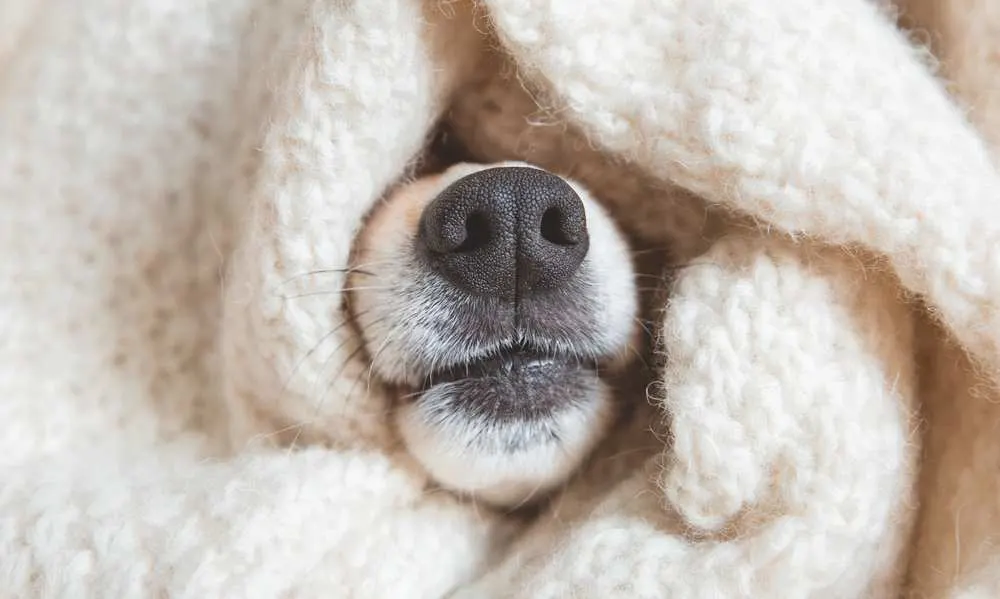
Quick Fixes
So you stayed outside for too long, both of you were having fun, and now your little pup is shivering and is giving you the doe eyes that it wants you to do something.
There are a few quick fixes you can do right now to warm up your corgi’s body temperature:
- Turn up the heat: pretty self-explanatory; if your corgi is cold, the first thing you should do is turn up the heat for the entire house; it’ll make things easier going forward
- Put a warm blanket over them
- Dry their paws and clean any mud or snow that got stuck ( especially those defrosters they use during the winter) to prevent their skin from cracking
- Put another blanket in their bed, so they’re even warmer at night

Exercise During Winter Months
The things we just listed are some ideas that you can do right now, but what will definitely give the best long-term results is regular exercise.
Find a place indoors where you can tire out your corgi without breaking things around the house.
If you’re missing ideas on how to properly exercise your pup, we have an article right here on Corgicare.com, it’s called “Corgi workout”, and it has everything you need and more.
It is a tad bit longer than regular articles, but it will provide you with all the information you need and keep you from injuring your corgi with any potentially strenuous exercise.
Anyways, regular exercise should make your corgi sturdier and more resilient to outside conditions.

A Jacket/Winter Coat
We have an entire article on this called “Do corgis need winter coats?” that covers this topic in depth. We recommend you go check it out.
The quickest answer would be that they usually don’t need a winter coat. However, this depends on a lot of factors.
So if you don’t want your loving pup to catch a cold, take a look at the article; you might learn a thing or two about your corgi you didn’t know.
In addition to that, brushing your pup regularly during the winter should improve your corgi’s blood circulation and give them that extra bit of warm oomph we’re all looking for.
See Also: Do Corgis Need Sweaters? How Cold Is Too Cold?
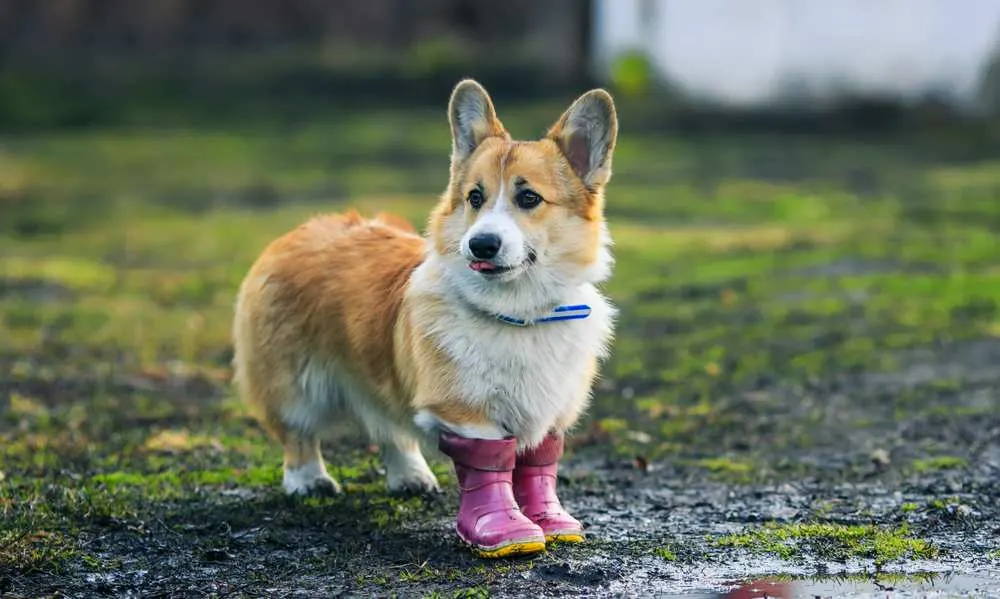
Winter Boots
Besides the winter coat, winter boots are also an excellent option to keep your corgi nice and toasty.
During the winter months, in order to prevent the roads from freezing, people use deicers to eliminate the potential for any kind of excessive sliding and dangerous accidents.
That’s just great and very responsible. However, what’s not so great, is the fact that those deicers can wreak havoc on your corgi’s paws.
It will eat out and crack the skin on their paws.
In order to prevent that, you can buy a nice pair of boots for your corgi. Make sure you do a fair bit of research first since corgis have weirdly shaped paws.
Also, most dogs don’t like having anything on their feet, so don’t overspend until you see how your pup behaves with its paws.

Conclusion – Are Corgis Cold Weather Dogs?
To sum it all up, corgis can stand the cold, but you shouldn’t make them live outside in the cold.
Corgi’s double coat offers a fair amount of protection from rain, snow, and just cold weather in general, but it doesn’t make them completely weatherproof.
They love colder weather and snow, and a 20-minute walk shouldn’t bother them in the least.
However, if you plan on spending hours outside, make sure your corgi has a good winter jacket and boots.
Finally, we’ve given you some tips on keeping your corgi warm during the winter and making sure it doesn’t catch a nasty cold.
All in all, corgis are more resilient to cold than a lot of other dog species, but they aren’t polar bears, and you shouldn’t treat them as such.
Read Also: Can Corgis Live In Hot Weather?

